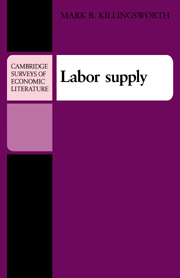Book contents
- Frontmatter
- Contents
- List of tables and figures
- Preface
- 1 The simple static model of labor supply
- 2 Extensions of the simple short-run model of labor supply
- 3 Empirical studies of static labor supply models: introduction, with a summary of “first-generation” results
- 4 Second-generation studies of static labor supply models: methodology and empirical results
- 5 Dynamic labor supply models
- 6 Labor supply, taxes, and transfers
- 7 Conclusion
- Bibliography
- Name index
- Subject index
- Frontmatter
- Contents
- List of tables and figures
- Preface
- 1 The simple static model of labor supply
- 2 Extensions of the simple short-run model of labor supply
- 3 Empirical studies of static labor supply models: introduction, with a summary of “first-generation” results
- 4 Second-generation studies of static labor supply models: methodology and empirical results
- 5 Dynamic labor supply models
- 6 Labor supply, taxes, and transfers
- 7 Conclusion
- Bibliography
- Name index
- Subject index
Summary
The analysis of labor supply has an important bearing on a wide variety of issues of economic and social policy. Debates about welfare payments, the Social Security system, and the income tax system inevitably involve questions about work incentives. Recent attempts to develop methods of economic growth accounting and indices of economic welfare bring up questions about the valuation of an important “good,” leisure, that is not included in the national income and product accounts. Controversies about unemployment, wage rigidity, and other macroeconomic problems often raise questions about microeconomic choices between labor and leisure; discussion of male–female wage differentials and household behavior often focuses on male–female differences in labor–leisure choices.
Because of its intrinsic interest, because of its relevance to these and other issues, and – in no small way – because of healthy dollops of research funding, the study of labor supply in the past two decades has resulted in an enormous body of theoretical and empirical work. The purpose of this book is to summarize much of this work on labor supply, to give it some coherence and structure, to note unresolved problems, and to suggest a few directions for future research. My hope is that this survey will be useful, albeit in somewhat different ways, to several kinds of readers.
- Type
- Chapter
- Information
- Labor Supply , pp. xiii - xviPublisher: Cambridge University PressPrint publication year: 1983

